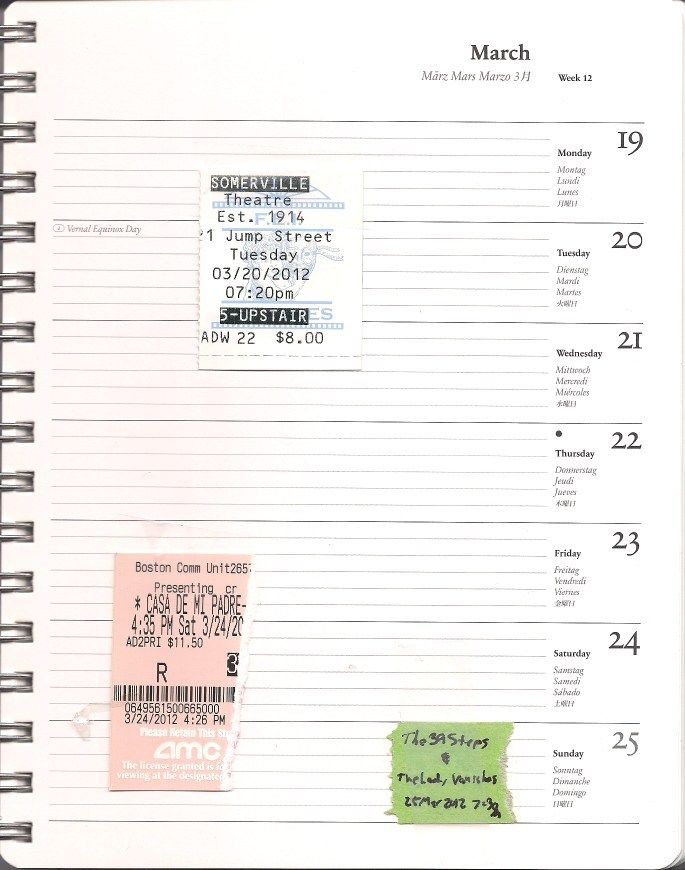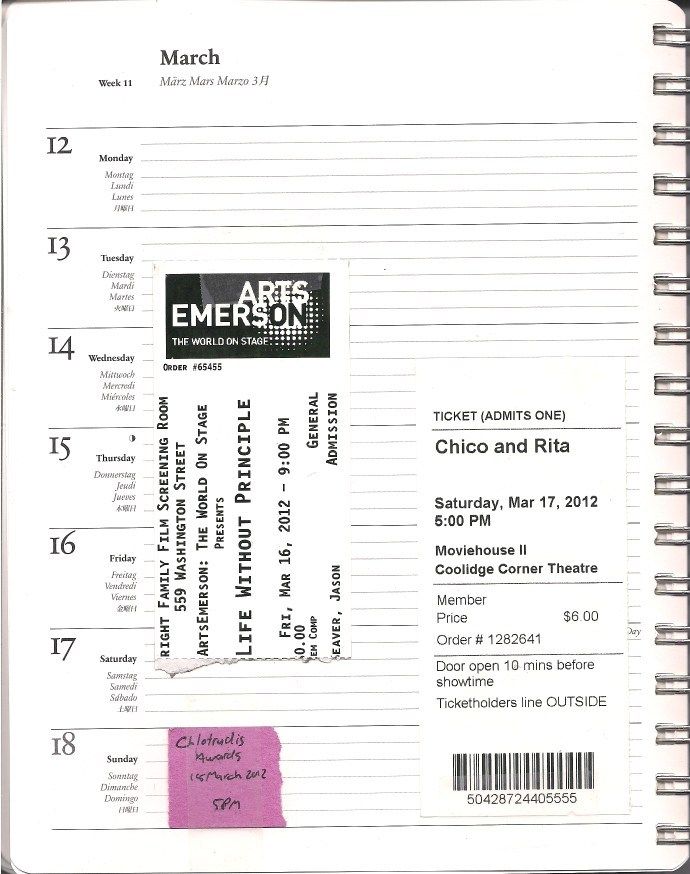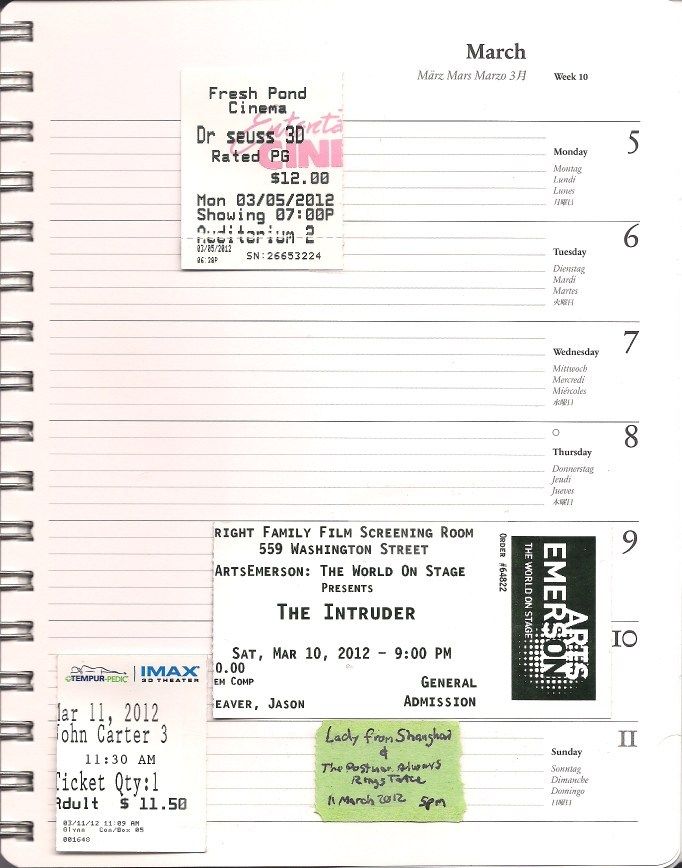- The Boston Underground Film Festival is cut down from what it was last year - one screen instead of two, half as many movies, only running four days instead of eight. But, you can still see everything, as the second half was all repeats anyway. It's still a very strong line-up - I am tremendously excited to see Katsuhito Ishii's newest, Smuggler, on Friday night, and on Sunday, I and can recommend both Karate-Robo Zaborgar at noon on Sunday and especially Klovn: The Movie at 8:30pm that night.
After the end of the festival, they have the DocYard presentation of Scenes of a Crime on Monday, a true-crime documentary that dissects an interrogation that led to a disputed confession and high-profile trial. On Tuesday and Wednesday, the Brattle is a venue for the Together Festival, with musical docs on both nights: "Take One" and The Chemical Brothers: Don't Think on Tuesday and The Electric Daisy Carnival Experience on Wednesday. They keep a similar vibe going on Thursday, with Scott Pilgrim vs The World at 6pm and a Rock Band Night at 9pm. - You know what would fit in great with all that stuff? "An Evening with Don Hertzfeldt", with the iconoclastic animator in town to present "It's Such a Beautiful Day", the final entry in his "Bill" trilogy. Along with the rest. And some of his previous shorts. In 35mm. But it's sold out and I, like an idiot, didn't get tickets ahead of time. Well, I guess I'll have to be satisfied with some of the other special screenings, like the Oscar-nominated Monsieur Lazhar, starring Fellag as an Algerian immigrant to Quebec who takes a job as a substitute teacher and must step in as a long-term replacement for a beloved middle-school educator. It's the Sunday morning Talk Cinema offering. There are also Friday and Saturday midnight shows of Riki-Oh: The Story of Ricky, a famously over-the-top martial arts action movie about a super-powerful fighter cleaning up the prison where he's locked up. Action and gore-a-plenty.
Also playing midnights, as well as all day, is The Raid (which has had "Redemption" added as a subtitle since it played Sundance). It features the director and star of Merantau, which was pretty darn good. Almost all reports on this are that it's excellent, taking a simple premise (drug lord at the top of an apartment building, cops entering at the bottom, and every room in between packed with killers) and building non-stop action from it. Also playing at Kendall Square, Embassy Square, and Boston Common. - Also playing Boston Common is Intruders, a new horror movie from Juan Carlos Fresnadillo. Man, he does not work often enough - Intacto, 28 Weeks Later, and now this in just over a decade. It's a horror movie with an international cast (Clive Owen, Carice van Houten, Daniel Brühl) about a monster called "Hollow Face" who is simultaneously appearing to different families. Not getting the greatest reviews, but Intacto was so good that I'll probably give it a shot.
The multiplexes are opening other fantasy fare as well; the big opener is Wrath of the Titans, with Sam Worthington returning as Perseus, heading into the underworld to rescue Zeus from Hades. Kind of a mythological stew, but early word has it better than Clash. It plays in 3D at Boston Common (including the Imax-branded screen), Fenway, Harvard Square, Fresh Pond, and the Arlington Capitol; 2D shows at Boston Common, Fenway, and Fresh Pond. Also playing is Mirror Mirror, a comedic retelling of Snow White with Julia Roberts as the evil queen, Lily Collins as the princess, and Armie Hammer as Prince Charming. Strangely (perhaps), it's directed by Tarsem Singh, who makes visually stunning movies but whose previous three films don't suggest a family-friendly story - I honestly thought he was directing the other, darker Snow White story coming out this summer. This one plays the Somerville Theatre, Fresh Pond, the Belmont Studio, Boston Common, and Fenway. - In addition to The Raid, Kendall Square offers up three new movies this week. Writer/director Taika Waititi will be in town today (30 March) to introduce the 7pm and 9:40pm screenings of Boy, his comedy about an 11-year-old Maori kid whose fantasies about his absent father are due for some revision after the man himself returns from jail. There will be Q&A after the 7pm show. Also opening are The Deep Blue Sea, Terrence Davies's adaptation of Terrence Rattigan's play about an affair between a judge's wife (Rachel Weisz) and a RAF pilot (Tom Hiddleston) in post-war London. And then there's The Kid with a Bike, which while not Belgium's Oscar nominee (Bullhead was the surprise for that honor), is a more traditional sort of film for that honor, with filmmakers Jean-Pierre and Luc Dardenne crafting a story about an orphaned boy.
- It's all classics at the Paramount this weekend, with a Re-Released! double feature of Laura andGilda on Friday and Saturday nights. Gene Tierney and Rita Hayworth play the respective title characters, and both are presented in new/restored 35mm prints. The Saturday and Sunday afternoon "Gotta Dance" screening is The Great Ziegfeld, MGM's 1936 musical about the legendary showman featuring The Thin Man stars William Powell and Myrna Loy.
- The Harvard Film Archive spends most of the weekend on Inutile: The Cinema of Carmelo Bene, a retrospective of the avant-garde cinema of the Italian theatrical director. Salomé and One Hamles Less play Friday, Don Giovanni and Our Lady of the Turks on Sunday, and Capricci on Monday, many of them preceded by short films. On Saturday, Jeff Daniel Silva is in town with Ivan & Ivana, a documentary about two Serbs who moved to the United States just before the recession hit. It played IFFBoston last year and also serves as a sequel to Silva's first documentary, Balkan Rhapsodies.
- The MFA continues The Boston Turkish Film Festival this weekend with screenings of Once Upon a Time in Anatolia (Friday), Future Lasts Forever, In Flames (both Saturday), and Somersault in a Coffin (Sunday). They also will be showing Senna, Asif Kapadia's popular recent documentary on Formula One legend Ayrton Senna, on Sunday, Wednesday, and Thursday, as well into next weekend.
- The Regent Theatre in Arlington has one movie screening this week, All In - The Poker Movie, a documentary on the 21st-century boom in poker as a phenomenon. It plays Thursday the 5th at 7:30pm, with a second showing on the 12th.
- The Americana Trio is in Somerville tonight with a Not So Silent Cinema screening of three Buster Keaton shorts at The Armory. The three shorts - "The Goat", "The High Sign", and "One Week" - are funny ones, and they'll be accompanied by a new score performed live.
- The second-run shuffle brings The Artist to both the Somerville Theatre and Arlington Capitol, and while Hugo continues to play matinees at the Capitol, it will no longer be running in 3-D.
My plans: Basically living at the Brattle for BUFF through Sunday, with a brief trip to the Coolidge on Sunday for Monsieur Lazhar. I may try and cajole the folks I know there into letting me into the sold-out Hertzfeldt show on Monday, but when that fails, I figure that The Raid will be one heck of a consolation prize.


